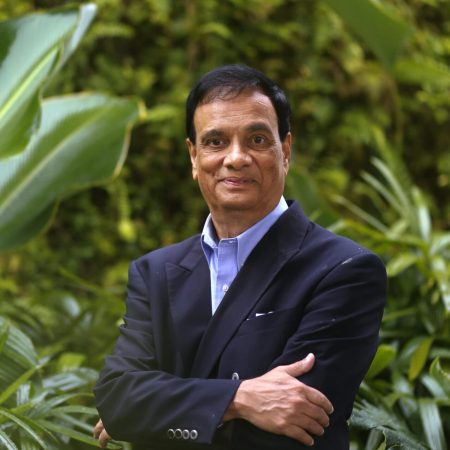Vinod Thomas
Passionate about humanity’s imperative
towards achieving sustainable development
About Vinod
Renewable Energy Resources | Carbon Pricing | Cost Benefit Analysis | Risk & Resilience | Net-zero Carbon 2050 | Decarbonisation | Water Policy | Education | Agricultural Pricing | Environmental Sustainability | Urban Strategy | Evaluation
Extensive experience in the study, teaching, and practice of development policy, including social and environmental policy and analysis. Leadership and hands-on roles in global finance and management, investment projects, and country policies. Analytical and operational contributions in project design, ethical business, and independent evaluation. Track record of excellence in teaching, writing, and outreach. Demonstrated leadership in inclusive and impactful teamwork. Part of networks of academia and practitioners in development and sustainability.

Books

Risk and Resilience in the Era of Climate Change
Essential insights on the interaction between rising risks and raising the bar for resilience during the climate crisis.

From Inside Brazil: Development in a Land of Contrast
This book presents a strong agenda and action plan to achieve for Brazil both economic growth and improved welfare for its citizens.

The Quality of Growth
Economic growth is key to development both in its pace and also in its quality. 'The Quality of Growth' is a collection of essays in an ongoing research project.
Upcoming Events
A meeting to bring together leaders from medicine, medical tech, telecom, public policy, regulatory, banking, hospital admin and healthcare insurers to tackle the humanitarian possibilities of telesurgery.
This 4th IEO-EED Conference will focus on how evaluation practice has increasingly integrated the cross-pollination of environmental, socioeconomic, and policy domains. For more details, visit here.
Launching the book, Risk and Resilience in the Era of Climate Change at the Asian Institute of Management, Manila.
Time: 10:30 am to 12:00 noon. For upcoming details, visit here.
Vinod Thomas will discuss the interaction between risk and resilience in the era of runway climate change. Three insights emerge:
– Accounting for the root causes of the problem, not just the symptoms, is essential to slowing climate disasters. It is therefore vital to link carbon emissions from fossil fuels to mounting climate disasters.
– Growth economics must factor in the failure of businesses and governments to tackle global warming. This calls for a fundamental revision in the teaching and practice of business and economics.
– Prevention must become a far bigger component of resilience building, with preparedness for more frequent catastrophes built in. Recovery from a disaster is not just about returning to status quo but building back better.
Vinod Thomas is a Professor at National University of Singapore, and Distinguished Fellow in Development Management at the Asian Institute of Management, Manila. His current areas of work are climate change, sustainable development, disaster risk management and resilience building. He was Senior Vice President, Independent Evaluation, at the World Bank, and Director General, Independent Evaluation, Asian Development Bank. He is the author of The Quality of Growth (2000), Climate Change and Natural Disasters (2017), and Economic Evaluation of Sustainable Development (with Namrata Chindarkar, 2019), and Risk and Resilience in the Era of Climate Change (2023), among others.
He won the 2022 Lee Kuan Yew School of Public Policy Honorary Teaching Award. He holds a PhD and MA in Economics from the University of Chicago and a BA from St. Stephen’s college, Delhi.
Launching the book Risk and Resilience in the Era of Climate Change, the event will highlight the interaction between risk and resilience in the era of runaway climate change. It will especially focus on Southeast Asia, a region not only at the forefront of climate disasters, but also one that is among the highest contributors to greenhouse gas emissions. It faces the daunting imperative of decarbonizing economic activities and pursue a far more sustainable growth path.
Broadly speaking, three insights for greater traction on climate policy emerge from the book.
First, to get public opinion behind actions to slow climate disasters, it is vital to account for the root causes of the problem, not just the symptoms. It is therefore crucial to link carbon emissions from fossil fuels to mounting climate disasters.
Second, there needs to be a transformation in the way growth economics is positioned. It must factor in the failure of businesses and governments to tackle global warming. This calls for a fundamental revision in the teaching and practice of business and economics.
Third, prevention must become a far bigger component of resilience building, and there needs to much greater preparedness in Southeast Asia for more frequent catastrophes built in. Recovery from a disaster is not just about returning to status quo but building back better.
The discussion will frame the challenges in the context of the current growth patterns in Southeast Asia. It will aim to bring out the roadblocks to achieving far reaching changes in the present carbon-intensity of growth and see how they can be dealt with. It will also consider needed policies and investments in building greater climate resilience in the region, recognizing the other priorities governments struggle with.
Date: 4 April 2023
Time: 4:00-5:30pm
Location: Lee Kuan Yew School of Public Policy, NUS
Sign Up
Media
Book Reviews:
Risk and Resilience in the Era of Climate Change
Contact
Explore possible partnership in research, education or speaking engagements with
Vinod Thomas